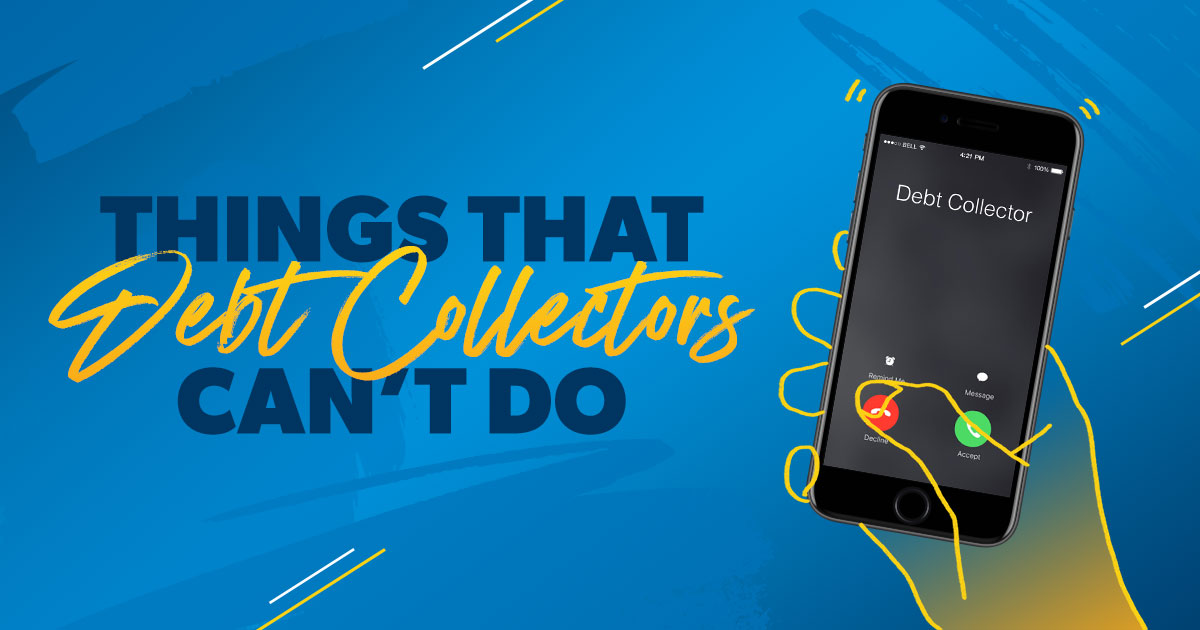Don’t Believe the Lies: 5 Myths About What Debt Collectors Can Do
4 Min Read | Feb 28, 2025

Remember your first day at a new school? You probably had all sorts of questions about what the rules were, or maybe you were worried about saying the wrong thing to the wrong person.
When you have a debt go into collections, it can feel like the first day of school. You don’t know what to say or what a collector can say to you. If you are facing collection calls, keep your head and don’t panic. Collectors sometimes lie in an attempt to scare you. Here are some of the more popular myths about dealing with collectors—and the truths behind them.
Myth: Collectors can call you any time they want.
Truth: Federal law restricts the hours in which a collector may call.
According to the federal Fair Debt Collection Practices Act (FDCPA), a collector may only call you between the hours of 8 a.m. and 9 p.m. in your time zone. If they call you demanding money in the middle of the night or before breakfast, that is a violation of federal law. Make a note of the date and time of the call and the name of the caller. Tell the collector he or she is breaking the law by calling you this early/late, then hang up.
Myth: Collectors can call your relatives to bully you into paying.
Truth: They may call your loved ones, but they cannot reveal anything about the reason they are calling.
Calling your parents, siblings or friends is simply a move to embarrass you. It is legal, but if the collector mentions anything about your debt, they are breaking the law by revealing private financial information. All the collector can legally say is, “Tell him to call (name) at (number).”
Myth: Collectors can call you at work.
Truth: Not if you tell them they can’t.
Again, the FDCPA says it is illegal for a collector to call you at work if you notify them that they shouldn’t. When they do (since some collectors break more laws than Bernie Madoff), they try to embarrass you in front of your boss and coworkers the same way they do with your family and friends. If you are getting calls at work and want to cover your bases, send a certified letter to the collections firm, return receipt requested, saying they are not allowed to call you at work. This gives you proof that they have been notified not to call you. You can use that against them if you decide to report them to the Federal Trade Commission.
Myth: Collectors can garnish your wages if you don’t pay.
Truth: A collection agency can only garnish your wages after you are sued and the judgment is awarded.
If collectors bluffed any more often, they’d be featured on the World Series of Poker. One of the more popular claims they make is that they will take your next paycheck before you ever get it. But the only time they can garnish wages is after they have sued you (which only happens after months and months of nonpayment) and won the judgment. Don’t be fooled into thinking that they can somehow access the company payroll. The one exception to this is federal student loans and debts.
Myth: If you don’t pay, you are going to jail.
Truth: Uh, no.
You might go to jail—if you lived in the 1800s. But there are no longer debtor’s prisons in America. A collector who threatens you with criminal charges and jail time had better hope you don’t record the conversation, because that kind of threat is called extortion.
What Can I Do Going Forward?
The more you know about how collectors think (and bluff), the less intimidating they are. The more you know your rights, the more confident you can be working with them.
Get help with your money questions. Talk to a Financial Coach today!
If a debt collector is treating you incorrectly and the laws aren’t stopping them, let us fight this battle for you so you can get back to the basics of paying your bills and debts off. Once that is done, life will be as sweet as the last day of school.


